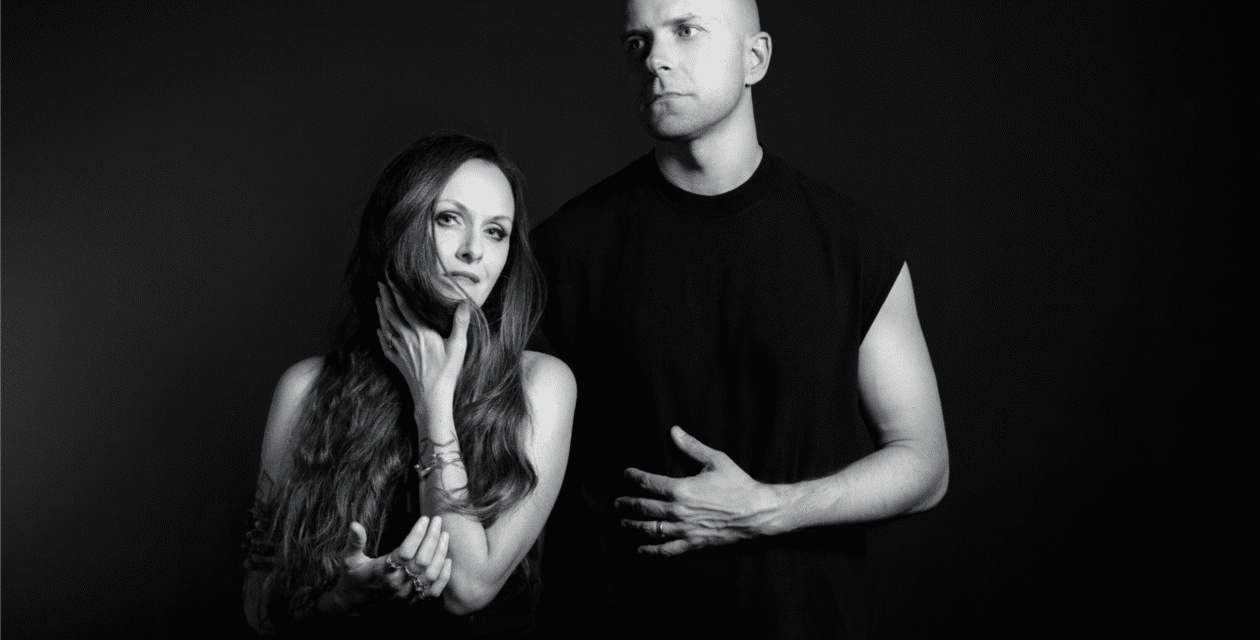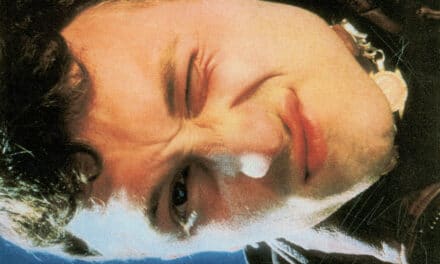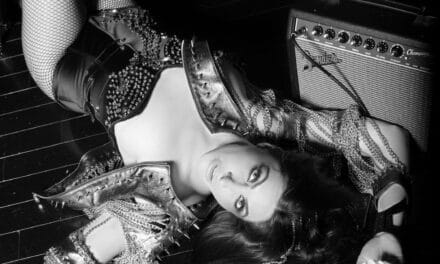Nashville heavy duo Friendship Commanders have never been ones to whisper, but with their upcoming album BEAR—out October 10 via Magnetic Eye Records—they’ve traded in restraint for a full-throttle emotional detonation. Anchored by Buick Audra’s towering riffs and crystalline vocals, and Jerry Roe’s seismic drumming, BEAR feels like a declaration of survival in a world that keeps trying to shrink you.
They’re kicking things off with a double blow: new singles “KEEPING SCORE” and “MELT,” each paired with striking visuals steeped in Nashville’s DIY heartbeat. The songs are opposites that coexist—sludge and shimmer, war cry and confession. One confronts the generational cycle of women undermining girls out of fear; the other is a bittersweet admission of never quite belonging, even among your own. Both hit like truth wrapped in distortion.
Produced alongside Kurt Ballou, BEAR is a record about belonging—where it’s found, where it’s denied, and the strange, liminal spaces in between. It’s heavy music that isn’t afraid of vulnerability, proof that sometimes the loudest sound in the room is honesty.
“KEEPING SCORE” is such a thunderous opener — it feels like a reckoning wrapped in riffs. How did that moment from your childhood evolve into the war cry we hear on the record?
BA: Thank you! Yes, that song is what I call the mother of the album; it was the first one written for the project, and really, the one that let me know which direction I was headed in for this body of work. As far as how the story of me being bullied by my best friend’s mother when I was kid made it into this moment, I think it was the culmination of a lot of overlapping awarenesses. I’ve been observing my outsider status with other women for some time now, and I think seeing women my age speak ill of little girls their sons were friends with made it all snap into focus for me. People like to blame the patriarchy and all of those now culturally ubiquitous terms on cis men, but I’d like to share that a huge amount of the shame, rejection, and damage I’ve taken on in this life was handed to me by other women. And it started when I was a kid. And not just a kid, a really vulnerable kid who was already a survivor of several things, who had already been kicked out by various parental figures. Fascinating for a grown woman to see that and attack instead of offering support. And by fascinating, I mean, horrific. I guess alongside the other awarenesses about my place in womanhood, it felt like it was time to talk about it.
You’ve called BEAR both heavy and light — sugar and fire, salt and air. Was that duality something you set out to create, or did it reveal itself in the songwriting process?
BA: It revealed itself to a certain extent when I was writing the album; I was aware that I was leaning into these hyper-pop sensibilities that seemed to line up with parts of the subject matter(s), and then the other compositions were heavy as hell. That was always true. We certainly honored those differences when we tracked the instrumental performances with Kurt. But I think it became most clear in the vocal recording process. Ballou doesn’t track my vocals; I always do them on my own in Nashville. When I got alone with these tracks, some of them just begged to be howled, while the others wanted those lovely doubles and layered harmonies. I took a month to sing BEAR, and I think the vocals shaped the two definitive sides of the project. When I was done with them, Jerry added various synth parts that really sent the sugar side over the top. And the other half? Brutal. On purpose.
There’s this powerful undercurrent of exile across the record — being pushed out of places you were supposed to belong to. What does ‘belonging’ mean to you now, after writing BEAR?
BA: Belonging means going where it’s warm, not where it’s freezing with the hopes of somehow raising the temperature. That’s not my job today. I’m just not that powerful. I have people around me who support me, who see me. All but two of them are not women, but they’re my close community of collaborators and friends. When I stopped trying to be in places that didn’t want me, I became better able to see who had never rejected me—who had only ever cared about and appreciated me. Now I feel so grateful to be here. Hopefully this album will help me hold onto that and not wander back over into dangerous territory.
Want to add that I do have a couple of women friends in other parts of the country, also weirdos who are outside of the fray. They rule. But my closest, intimate community, no. And there are certain kinds of feminists who will judge me for that, proving the point that there is no good way to be a woman—and believe me, they’ve let me know. Got it.
“MELT” is devastating in the softest way — the kind of song that punches you with its prettiness. How do you walk that line between beauty and brutal honesty without one undermining the other?
BA: Thank you for saying that! I think brutality often hides behind prettiness. In some of my exchanges with women that were truly leveling—like the earth was actually swallowing me whole—they’d say the wildest things to me in the sweetest tones. Just insulting me to my core with the loveliest lilts to their voices. I really wanted “MELT” to hold that duality, with me kind of kicking through it in the choruses, being too loud, as usual. I’m proud of how the track turned out, because it does offer both. The bridge still makes me cry when I hear it. The line, “I wanna know, was I marked at birth?” kicks my ass because it’s so painful and yet sung so melodically.
Meanwhile, I do want to know. Truly. If anyone knows if we’re marked for outsiderness from birth, hit me up.
You’ve described being ‘kicked out of womanhood’ — a phrase that’s heavy with both pain and clarity. What were the first signs that that was happening, and when did you decide it was time to speak it into music?
BA: In hindsight, I don’t think I was ever a card-carrying member. It was always conditional. Like, I could sit with them if I was in service to humankind, or children (especially their children), or the women’s movement, etc. I could sit with them if I agreed to be only one half of me and a man, whether a male partner, male sibling, or male collaborator—and whoever that man was would always be more important than me. I could sit with them if I didn’t take credit for my own work (they really hated that one, always trying to protect a man from my confidence/ competence). I could sit with them if I had no needs and was just happy to be “the good friend” on the other end of the line. I could sit with them if I was the most grateful, gracious specimen who ever lived, and who didn’t have any questions about the above list. I just never made the cut.
But to answer your question: I really started to notice it in 2023 when FC were in the middle of releasing our last album, MASS. I had several truly bizarre interactions with women that made me go, oh I’m not doing this correctly by their standards. At all. And what was more, I was observing groups of women together (I still do this all the time), and realizing I was never that. Not ever. That’s why “MELT” starts with the line, “No, I have never felt the way they look.” As I began to allow myself to feel the gravity of the distance between myself and them, the songs started to come. That’s how I knew it was time. The music always tells me when it’s time, and I know to listen to that.
Jerry, you said playing this album live feels like flying through a “bullseye made of fiery confetti.” What does BEAR ask of you both as performers — emotionally, physically, spiritually even?
JR: Performing this music has always been an intense experience. I think we both tend to always “go for it” with whatever project we’re in, but FC’s songs are all intensely personal to Buick, and she’s such an important person and presence in my life that the stories feel like mine too, and the message has become a cause that I believe in, and feel is worth fighting for. This record leans towards a brighter and more colorful palette sonically and the songs have more of a forward lean to them in tempo and energy, so it’s both a joyful experience and can tire me out more easily compared to the previous work, which sort of lumbers a bit more. No matter what, we play extremely loud and hard, and I’ve given myself injuries playing this music, so it requires a lot of me physically. This band is why I’ve developed a strict gym practice and stopped eating meat. It’s the only way I can make it work.
BA: It’s a lot of physical work, no question. Emotionally and spiritually, it saves my life. I’m so glad I’ve chosen to be loud in this life, musically and topically. It really moves the feelings through me and changes them in my system for good. A gift.
The production here is massive — you’ve got Kurt Ballou in the mix, and yet it still feels intimate, vulnerable, unfiltered. How did you build that kind of sonic intensity without losing the personal edges?
JR: Kurt deserves credit in that these are definitely just our sounds and us playing presented as recorded by him. On MASS and even more so on this record, he didn’t influence or tamper our ideas or sounds ever and just figured out how to best capture them. His room has a sound that anyone who’s listened to his work would immediately recognize, but it’s us playing our instruments. No samples/editing/tuning or anything.
BA: We were really focused on allowing for dynamics on BEAR. Because the compositions contained the stylistic duality, we made sure to protect the soft parts, to not just throttle the whole thing. My favorite soft spot is the bridge on “FOUND.” And the album’s closing piece, “DEAD & DISCARDED GIRLS,” was tracked with entirely different guitar and drum setups to be able to capture the quiet and the loud together. It was that important to us. That song marries the two sides of the record; I love it so much.
The video for “MELT” was filmed at DRKMTTR — a space that’s clearly meant a lot to you. What role has the Nashville underground scene played in shaping your sound and your sense of community?
JR: After many years of being a band, and getting through COVID, a lot of people dispersed and venues closed and bands broke up, and us and people like us all seemed to filter down into DRKMTTR as a homebase. It’s all-ages, nonprofit, run by honest good people who are in great bands of their own, and it was really impossible to imagine shooting a video for a song about finding belonging in any other place. Remarkably, the only day we could do it was the only day they had free on their calendar the whole month leading up to the song’s release. Felt like fate.
So many bands steer clear of the personal or the painful — but BEAR leans all the way in. What gives you the courage to write and release songs that expose so much?
BA: I don’t know what else I’d be doing, honestly. This is what I think about, what I see. I do feel like throwing up all the time, sure—and I do feel very exposed, yes. But I also feel like, this is simply what’s true for me. There’s zero chance I’m the only one. You’re never the only one, even if you’re the only one making noise about it at the time. I’ve learned the awkward and sometimes excruciating way, that this is how you find the people who will get you. You show up honestly. You tell the truth.
This album feels like a manifesto for the misfits — for people who’ve been made to feel too much, too loud, too other. What do you hope someone who feels lost hears when they press play on BEAR?
BA: Well, certainly, I hope anyone who feels lost, lonely, or not enough, feels known and heard by this body of work. Because, same. I always want to make work that finds whoever needs it. You are enough, and I say so in the lyrics.
But beyond that, I hope the other kinds of people hear it and know the cost of treating people poorly, of moving that elusive bar of belonging—of hiding behind junk horoscopes and other things that give one license to be mean, dismissive, shitty. People die. People literally don’t survive some brands of loneliness and rejection, and I want this project to go down in recorded history as a set of statements by someone who lived long enough to make it. The album is dedicated to “all of the bad daughters,” and that includes the ones who didn’t survive. This album of fire is for them—and is staring the ones who made them feel unworthy straight in the eyes.
But the outsiders are always welcome with me, with us. We love you and want you to come sit with us. Go where it’s warm. Stay alive.





